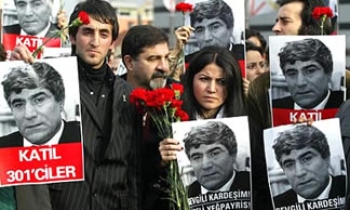WASHINGTON, Feb. 18 (UPI) -- A joint Spanish-Turkish initiative backed by the United Nations is being mentioned as a possible forum for restoring calm between Europe and the Islamic world following the Mohammed cartoon debacle originally triggered by Denmark.
This is the Alliance for Civilization, first mentioned in the context of the cartoon crisis by U.N. Secretary General Kofi Annan last week. The idea was further taken up Thursday at a European Union meeting in Vienna in which Austrian Foreign Minister Ursula Plassnik brought together two senior Danish officials and three leading Muslim representatives to discuss ways of reducing the current wave of anti-European tension. At present, Austria holds the rotating presidency of the European Union.
A report on the meeting circulated to EU member countries said the Alliance of Civilizations would be "one of the best frameworks to enhance dialogue between Europe and the Islamic world." The Alliance's "high level group" - its 20-member multi-national working body - is due to meet in Doha, capital of the Gulf state of Qatar, later this month.
According to an Austrian Embassy spokesperson in Washington, Thursday's meeting was attended by Denmark's Foreign Minister Per Stig Moeller, and Bishop Steen Skovsgaard of the Danish People's Church in Lolland-Falster, The Grand Mufti of Syria, Ahmed Badr Eddin Hassoun, the Grand Mufti of Bosnia-Herzegovina and President of the Council of Ulema Mustafa Ceric, and the President of the Islamic Religious Community in Austria, Professor Anas Schakfeh.
The publication of 12 cartoons lampooning the Prophet Mohammed in a Danish newspaper in September and subsequently reproduced in other European papers sparked violent demonstrations across the Islamic world with the loss of more than 20 lives. Pakistan, Syria, and Lebanon, were the scenes of particularly vehement protests. On Friday 11 protesters were killed in Tripoli, the Libyan capital, in clashes with police. There were also demonstrations by Muslims in Western countries.
The Vienna meeting also referred to a planned conference of European Imams in Vienna in April, and a seminar on "Xenophobia and Racism in the Media" in May also in the Austrian capital.
Just what the Alliance of Civilizations' role would be in the cartoon crisis is not clear, but observers said it could turn out to be the right initiative at the right time. It was proposed by Spanish Prime Minister Jose Luis Rodriguez Zapatero in a speech to the U.N. General Assembly two years ago out of his growing concern at the widening gap in understanding between the West and the Islamic world. Zapatero has since been joined as a co-sponsor by Turkish Prime Minister Recip Tayyip Erdogan.
The Alliance's mandate is to hold four meetings and then recommend a series of specific initiatives by the end of 2006 under the title "Agenda for Peace". The group's report will cover four main areas - education, academia, media, and the internet.
Whether the alliance will remain in being once it has completed its initial task remains uncertain, a U.N. source said Friday. However, one indication of the apparent timeliness of the Zapatero/Erdogan initiative came in the form of the Bush administraton's support. Earlier this week that U.S. Secretary of State Condoleezza Rice wrote a letter to Spanish Foreign Minister Miguel Angel Moratinos expressing U.S. backing. Rice said the alliance "promises to facilitate greater understanding and promote democratic reform, peace, and stability in the Middle East. We hope to be able to support projects for concrete alliance that are compatible with our own objectives in the Middle East."
The Alliance of Civilizations already has support from a slew of other countries including Pakistan, Egypt, Britain, Italy, and Argentina. Operating out of the United Nations its core is the "high level group" drawn from several Western and Islamic countries, and with Spanish and Turkish ch-chairs, that will compile the recommended initiatives.
Earlier this month, Zapatero and Erdogan, in a letter on the cartoon crisis published by the Paris International Herald Tribune, called for "respect and calm" but "morally and politically" rejected publication of the Mohammed cartoons. "There are no rights without responsibility and respect for different sensitivites," they wrote.









